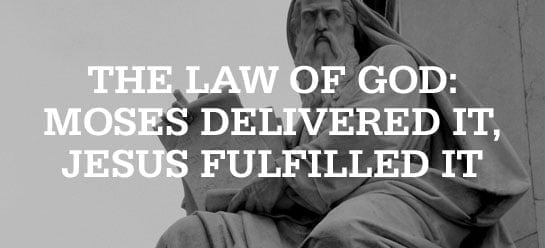⏱️ Estimated Reading Time: 6 min read
This article is part 3 in a series titled Jesus, the Truer and Greater Moses, in which we look at how the life and ministry of Moses is but a shadow of Jesus Christ. You can read part 1 and part 2.
As a prophet of God, Moses spoke God’s words to God’s people. He was a messenger. One of the greatest messages the prophet delivered, of course, was the message of the law of the Lord.
Leviticus 19 unpacks what the Lord told Moses about His law:
And the LORD spoke to Moses, saying, “Speak to all the congregation of the people of Israel and say to them, You shall be holy, for I the LORD your God am holy. Every one of you shall revere his mother and his father, and you shall keep my Sabbaths: I am the LORD your God. Do not turn to idols or make for yourselves any gods of cast metal: I am the LORD your God.”
(Lev 19:1-4)
What is the Law?
We can see from Leviticus 19 that the law of the Lord can be summarized in two words: be holy.
Or, to paraphrase from the apostle Peter: be holy as God is holy (1 Pet. 1:15-16).
Bob Hoekstra is helpful here in explaining:
The message of the law of God is thus: be as holy as God if you want to relate to Him-be as holy as God if, by your best effort, you wish to measure up to His commands and standards. The message of the law of God is that if one wants to relate to a perfect God through his performance before His standards and laws, then there is one thing that person must be: perfect.
Moses Delivered the Law
God called His prophet, Moses, up to the top of Mount Sinai. There, He gave Moses the law that His people would be required to live by, the law that sets them apart as holy just as He Himself is holy.
At the top of that mountain, the Lord pressed His divine finger into tablets of stone, carving the words of His law. Moses took this law and delivered it to God’s people. For generations, the prophet would be considered the herald of God’s Ten Commandments, the one who delivered the law so that God’s nation might be set apart from all other nations, a witness to the world about the character of their holy God.
The Law Is Not Enough
As great and important the law of God is, it can only do what God intended it to do. The author of Hebrews explains:
“For on the one hand, a former commandment is set aside because of its weakness and uselessness (for the law made nothing perfect); but on the other hand, a better hope is introduced, through which we draw near to God.” (Heb. 7:18-19)
While the law itself is perfect (Psa. 19:7), it does not ever claim to make anyone perfect. Galatians 2 emphasizes this in stating that the law can never justify.
“We know that a person is not justified by works of the law but through faith in Jesus Christ, so we also have believed in Christ Jesus, in order to be justified by faith in Christ and not by works of the law, because by works of the law no one will be justified.” (Gal. 2:16)
In other words, God gives us His true and holy standard. And no one, by their own effort, is ever going to live up to the law’s demands.
So then, what gives? What is the purpose of the law? Paul tells us, in Galatians 3, that “the Law has become our tutor to lead us to Christ, so that we may be justified by faith” (Gal. 3:24).
The greatest ability and purpose the law of God has is to tutor us and teach us, pointing us to the only hope we have from the law’s demands: the Lord Jesus Christ.
Jesus Fulfilled the Law
John 1:17 tells us, “the law was given through Moses, but grace and truth came through Jesus Christ.”
How does that happen? How does Jesus Christ bring grace and truth?
By fulfilling the law on our behalf. In Jesus’ own words:
Do not think that I have come to abolish the Law or the Prophets; I have not come to abolish them but to fulfill them.
(Mat. 5:17)
The grace of God in Jesus Christ doesn’t render the law void but fulfilled. Jesus fulfilled it by living the perfect law-abiding life that we could never live and dying the law-satisfying death that we deserved to die.
Jesus was the only human being—the only image bearer of God—who walked upon the dirt of Earth’s ground and did not violate any of God’s laws. With His life, He fulfilled the law’s every demand. As Bob Hoekstra states, “What it said, He did. What it described, He was.”
Jesus was also the only human being who could fulfill the law’s penalty on behalf of sinners.. The law declared that “The soul who sins shall die” (Eze. 18:20). All of us, born from Adam, fall short of God’s glory and standard of life (Rom. 3:23). All of us, that is, except for Jesus. He died a death that He did not deserve so that we wouldn’t have to that death ourselves.
Jesus died on the cross and paid our debt so that we would stand justified, freely by His sovereign grace (Rom. 3:24). While Moses delivered the demands of the law, Jesus fulfilled them when no one else could. And He did so on behalf of sinners like you and me.
This is the grace of God.
Because of Jesus, the white throne of judgment has become a sweet throne of grace.
And from it, He bids the sinner, “Come!”




